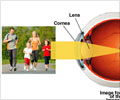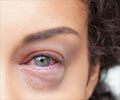A Government research body in Australia hopes that it may soon be possible to restore vision to people with failing eyes by removing their old lenses, and injecting new plastic ones.
Researchers at CSIRO Molecular and Health Technology came to this conclusion after they found that a lens material has the properties of a young person's lens.They say that the new polymer developed by them may one day be used to improve the sight of people with age-related short-sightedness.
"It has the refractive index properties that are required in the human eye," ABC Science quoted Dr Keith McLean, who heads up CSIRO's biomedical device research, as saying.
While making a presentation on the research at a recent biomaterials conference at the University of New South Wales in Sydney, the researcher said that the lens in each eye hardens and stiffens as people age, making it more difficult to focus.
"Because it stiffens, the muscles in the eye are no longer able to squeeze the capsule or bag which contains the lens so you therefore lose the ability to close focus," said McLean.
He said that the polymer developed by his team could be injected into the lens capsule as a liquid, and then firmed up once it was in place.
Advertisement
"After it's crosslinked it has the consistency then of honey. The muscles in the eye are then able to again squeeze (the lens) and restore that ability to close focus," he said.
Advertisement
"We are able to give the eye the properties we would want it to have," he said.
According to him, the lens polymer has also been tested in human cadaver lens capsules in India and the US, using a machine that simulates the eye muscles.
McLean and his colleagues are expecting to begin human trials in the next one to two years, and say that other tests on the safety and effectiveness of the lens will also be conducted during the next 10 years.
"There are some unknowns here," he says.
McLean has revealed that the new lens material is based on siloxane, which is very biocompatible and is already used in biomedical devices.
Even though it has been found to be safe when implanted for a short time in live rabbits, McLean concedes that longer-term tests are required.
He even insists that it needs to be ensured that the lens material does not leak from the eye capsule or go opaque over the long term.
Source-ANI
SRM












